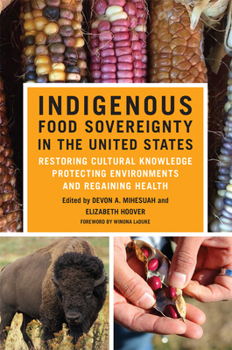Indigenous Food Sovereignty in the United States: Restoring Cultural Knowledge, Protecting Environments, and Regaining Health Volume 18
(Part of the New Directions in Native American Studies Series)
"All those interested in Indigenous food systems, sovereignty issues, or environment, and their path toward recovery should read this powerful book." --Kathie L. Beebe, American Indian Quarterly Centuries of colonization and other factors have disrupted indigenous communities' ability to control their own food systems. This volume explores the meaning and importance of food sovereignty for Native peoples in the United States, and asks whether and how it might be achieved and sustained. Unprecedented in its focus and scope, this collection addresses nearly every aspect of indigenous food sovereignty, from revitalizing ancestral gardens and traditional ways of hunting, gathering, and seed saving to the difficult realities of racism, treaty abrogation, tribal sociopolitical factionalism, and the entrenched beliefs that processed foods are superior to traditional tribal fare. The contributors include scholar-activists in the fields of ethnobotany, history, anthropology, nutrition, insect ecology, biology, marine environmentalism, and federal Indian law, as well as indigenous seed savers and keepers, cooks, farmers, spearfishers, and community activists. After identifying the challenges involved in revitalizing and maintaining traditional food systems, these writers offer advice and encouragement to those concerned about tribal health, environmental destruction, loss of species habitat, and governmental food control.
Format:Paperback
Language:English
ISBN:0806163216
ISBN13:9780806163215
Release Date:August 2019
Publisher:University of Oklahoma Press
Length:390 Pages
Weight:1.24 lbs.
Dimensions:0.9" x 6.0" x 9.0"
Customer Reviews
0 rating





